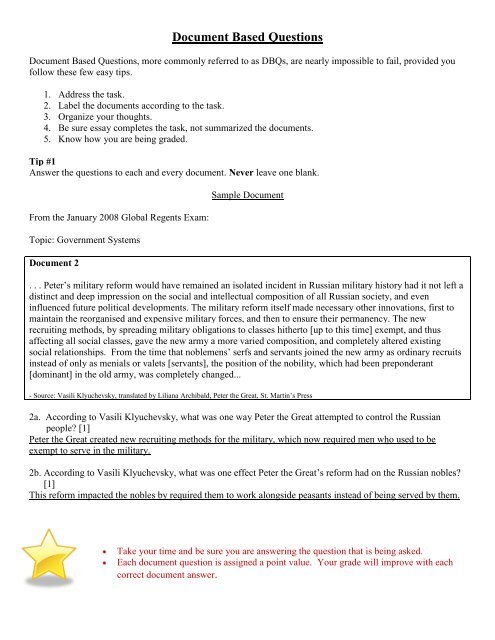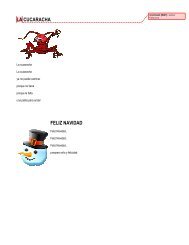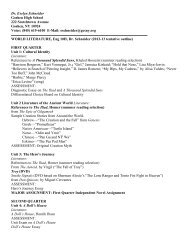DBQ Writing Tips
DBQ Writing Tips
DBQ Writing Tips
Create successful ePaper yourself
Turn your PDF publications into a flip-book with our unique Google optimized e-Paper software.
Document Based Questions<br />
Document Based Questions, more commonly referred to as <strong>DBQ</strong>s, are nearly impossible to fail, provided you<br />
follow these few easy tips.<br />
1. Address the task.<br />
2. Label the documents according to the task.<br />
3. Organize your thoughts.<br />
4. Be sure essay completes the task, not summarized the documents.<br />
5. Know how you are being graded.<br />
Tip #1<br />
Answer the questions to each and every document. Never leave one blank.<br />
From the January 2008 Global Regents Exam:<br />
Topic: Government Systems<br />
Document 2<br />
Sample Document<br />
. . . Peter’s military reform would have remained an isolated incident in Russian military history had it not left a<br />
distinct and deep impression on the social and intellectual composition of all Russian society, and even<br />
influenced future political developments. The military reform itself made necessary other innovations, first to<br />
maintain the reorganised and expensive military forces, and then to ensure their permanency. The new<br />
recruiting methods, by spreading military obligations to classes hitherto [up to this time] exempt, and thus<br />
affecting all social classes, gave the new army a more varied composition, and completely altered existing<br />
social relationships. From the time that noblemens’ serfs and servants joined the new army as ordinary recruits<br />
instead of only as menials or valets [servants], the position of the nobility, which had been preponderant<br />
[dominant] in the old army, was completely changed...<br />
- Source: Vasili Klyuchevsky, translated by Liliana Archibald, Peter the Great, St. Martin’s Press<br />
2a. According to Vasili Klyuchevsky, what was one way Peter the Great attempted to control the Russian<br />
people? [1]<br />
Peter the Great created new recruiting methods for the military, which now required men who used to be<br />
exempt to serve in the military.<br />
2b. According to Vasili Klyuchevsky, what was one effect Peter the Great’s reform had on the Russian nobles?<br />
[1]<br />
This reform impacted the nobles by required them to work alongside peasants instead of being served by them.<br />
Take your time and be sure you are answering the question that is being asked.<br />
Each document question is assigned a point value. Your grade will improve with each<br />
correct document answer.
Tip #2<br />
Label the documents according to the task. You can usually find the topics the <strong>DBQ</strong> is about in the historical<br />
context.<br />
<strong>DBQ</strong> historical context and task from the January 2008 Regents.<br />
Historical Context:<br />
Throughout history, governments have sometimes attempted to control the thoughts and actions of their people.<br />
Three such governments include Russia under the rule of Peter the Great, Germany under the rule of Adolf<br />
Hitler, and China under the rule of Mao Zedong. The efforts of these governments greatly affected their societies.<br />
Task:<br />
Choose two governments mentioned in the historical context and for each:<br />
• Describe the efforts of the government to control the thoughts and/or actions of its people<br />
• Discuss an impact of this government’s efforts on its society<br />
You are limited to the options in the historical context. There is no reason to worry if you don’t know what any<br />
of them are. There are a series of documents that will help to trigger your memory.<br />
A sample thesis for this task is:<br />
Both of these bodies attempted to control their people and significantly impacted their society.<br />
Label each document according to the historical context.<br />
The label for the sample document would be Peter the Great.<br />
This will help you choose which option(s) you will be doing and will help you connect<br />
them to the task.<br />
Tip #3<br />
How you organize your information is almost as important as the information itself.<br />
The most important thing to remember is that this essay IS NOT A SUMMARY OF THE<br />
DOCUMENTS. You have a task to complete and you must do so using both the documents and outside<br />
information.<br />
Outside information is facts, examples, and/or terms that are about the topic and/or task but are not in<br />
the documents.<br />
Analysis is another important part to the completion of the essay. You must make connections between<br />
your facts and the task and also make connections between your facts themselves. Avoid a “shopping<br />
list” of facts.<br />
o For example, I need oatmeal, butter, sugar, flour, cinnamon, and raisins. What are these?<br />
Ingredients. Why do I need them? To make oatmeal raisin cookies. Nowhere in that list does it<br />
say cookies but you look at the ingredients and made a connection between them. That’s<br />
analysis.<br />
There is no one correct way to organize your information, but it must be logical and clear. This<br />
is a great place to practice all those English techniques you have learned!
The following is a suggestion on how to organize your essay:<br />
Part of Essay Suggested Format Applied to this Task<br />
1. Lead Sentence There have been a variety of governments since the beginning of<br />
2. Definition of civilization. A government is in charge of keeping order within<br />
Introduction Topic<br />
society. Two examples of these political bodies are Russia under<br />
3. Main Points Peter the Great and Germany under Adolf Hitler. Both of these<br />
4. Thesis bodies of government attempted to control their people and<br />
Statement significantly impacted their society.<br />
Body<br />
Paragraphs<br />
Conclusion<br />
1. Topic Sentence<br />
2. Document #<br />
- Explanation of<br />
document<br />
relevant to the<br />
main point<br />
- Outside<br />
information<br />
relevant to the<br />
main point &<br />
document<br />
(the more of this<br />
you have the<br />
better)<br />
3. Document # (if two<br />
documents are<br />
relevant to the same<br />
main point)<br />
- Explanation of<br />
document<br />
relevant to the<br />
main point<br />
- Outside<br />
information<br />
relevant to the<br />
main point &<br />
document<br />
4. Concluding Sentence<br />
1. Restate Thesis<br />
2. Summarize<br />
Main Points<br />
3. Final Thought<br />
Peter the Great made some interesting changes to Russia’s<br />
government. Russia was constantly playing ‘catch-up’ to Western<br />
Europe since they were dominated by the Mongols until the 16 th<br />
century. While Western Europe was going through their<br />
Renaissance, Russia was just gaining their independence. Peter,<br />
who came to power in the late 17 th century, was desperate to<br />
westernize his country. After spending time in Western Europe both<br />
working on the docks and dining with royals, Peter used his<br />
absolute power to institute several reforms that impacted society<br />
and military. According to Document 1a, Peter created a beard tax<br />
in which men would have to pay a tax in order to keep their beards.<br />
Since the largest part of Russia population was peasant, most<br />
Russians could not afford to keep their beards and had to shave<br />
them. This was extremely difficult for the population to accept as<br />
their beards were tied to their Orthodox religion, culture, and<br />
geography; however, one cannot disobey the orders of an absolute<br />
monarch. Peter also made changes to the military. He mandated all<br />
social classes to participate in the military. (Doc 2) This was the<br />
first time serfs entered the armed forces as soldiers and not servants<br />
to the nobles who served in the army. Although serfdom will<br />
remain prevalent in Russia up until Alexander II emancipated them<br />
in 1861, this created a brand new dynamic between rich and poor in<br />
the Russian military. One would have to conclude that filtered<br />
down through the rest of society as well. Peter is referred to as Peter<br />
the Great due to his westernization reforms in Russia and therefore<br />
greatly impacted Russia.<br />
The purpose of government is to provide social order; however,<br />
some rulers use their political power to control the minds and<br />
actions of their people, which greatly impacts the society. Peter the<br />
Great of Russia and Adolf Hitler of Germany are two examples of<br />
rulers who did just that. One can only speculate the course history<br />
would have taken without these two men.<br />
Obviously you would need a second body paragraph on Germany under Adolf for this sample essay but<br />
you get the idea on how to organize your thoughts, use the documents, and address the task.<br />
You can also clearly see that there is a balance between outside info and info used from the documents.<br />
Remember, this essay is not a summary of the documents. You must use the documents to complete the<br />
task in order to pass this essay.
Tip #4<br />
Know how you will be graded.<br />
The following is the rubric that we must use on the NYS Regents Exams for both Global and US History.<br />
Document Based Question Scoring Rubric<br />
Score of a 5:<br />
Shows a thorough understanding of the theme or problem<br />
Thoroughly develops all aspects of the task evenly and in depth<br />
Is more analytical than descriptive<br />
Incorporates relevant information from a majority of the documents<br />
Incorporates substantial relevant outside information<br />
Richly supports essay with relevant facts, examples and details<br />
Demonstrates a logical and clear plan of organization; includes an introduction and a conclusion that are beyond a<br />
restatement of the theme<br />
Score of a 4:<br />
Develops all aspects of the task but may do so somewhat unevenly<br />
Is both descriptive and analytical<br />
Incorporates relevant information from a majority of the documents<br />
Incorporates relevant outside information<br />
Supports the theme with relevant facts, examples and details<br />
Demonstrates a logical and clear plan of organization; includes an introduction and a conclusion that are beyond a<br />
restatement of the theme<br />
Score of a 3:<br />
Develops all aspects of the task but with little depth or develops most aspects of the task in some depth<br />
Is more descriptive than analytical<br />
Incorporates some relevant information from some of the documents<br />
Incorporates limited relevant outside information<br />
Includes some relevant facts, examples, and details; may include some minor inaccuracies<br />
Demonstrates a satisfactory and clear plan of organization; includes an introduction and a conclusion that may be a<br />
restatement of the theme<br />
Score of a 2:<br />
Minimally develops all aspects of the task or develops some aspects of the task in some depth<br />
Is primarily descriptive; may include faulty, weak or isolated application or analysis<br />
Incorporates little relevant information from the documents or consists of primarily relevant information copied from the<br />
documents<br />
Presents limited relevant outside information<br />
Includes few relevant facts, examples, and details; may include some inaccuracies<br />
Demonstrates a general plan of organization; may lack focus; may contain digressions; may not clearly identify which aspect<br />
of the task is being addressed; may lack an introduction and/ or conclusion<br />
Score of a 1:<br />
Minimally develops some aspects of the task<br />
Is descriptive; may lack understanding, application or analysis<br />
Makes vague, unclear references to the documents or consists primarily of relevant and irrelevant information copied from<br />
the documents<br />
Presents no relevant outside information<br />
Includes few relevant facts, examples, or details; may include inaccuracies<br />
May demonstrate a weakness in organization; may lack focus; may contain digressions; may not clearly identify which aspect<br />
of the task is being addressed; may lack introduction and/ or a conclusion<br />
Please note that in order to earn a Regents 4 or 5 you must use analysis – the how, why, so what.<br />
Always use specific details and key terms as often as possible. You had to learn those vocab words for a reason.<br />
If you are stuck, ask for help. We can’t tell you answers but we can help you relax and unblock your brain. The<br />
worst thing you could do is not write an essay.




